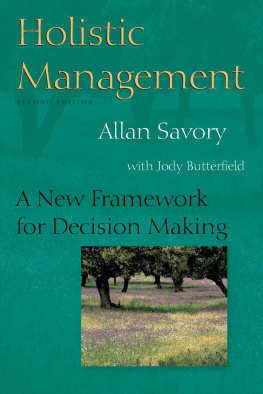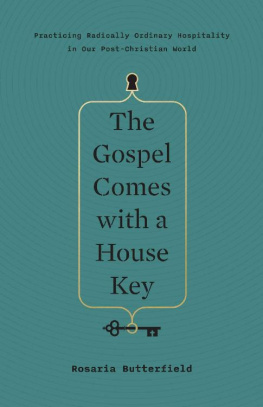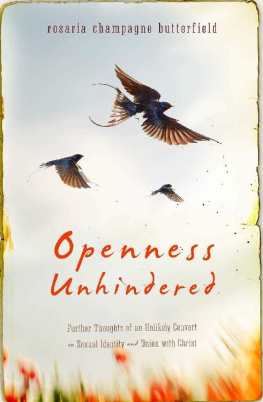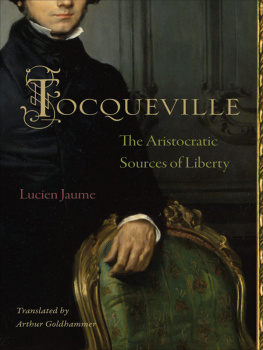The Making of Tocquevilles America
American Beginnings, 15001900
A Series Edited by Edward Gray, Stephen Mihm, and Mark Peterson
Also in the series:
PLANTERS, MERCHANTS, AND SLAVES: PLANTATION SOCIETIES IN BRITISH AMERICA, 16501820 by Trevor Burnard
RIOTOUS FLESH: WOMEN, PHYSIOLOGY AND THE SOLITARY VICE IN NINETEENTH-CENTURY AMERICA by April R. Haynes
HOLY NATION: THE TRANSATLANTIC QUAKER MINISTRY IN AN AGE OF REVOLUTION by Sarah Crabtree
A HERCULES IN THE CRADLE: WAR, MONEY, AND THE AMERICAN STATE, 17831867 by Max M. Edling
FRONTIER SEAPORT: DETROITS TRANSFORMATION INTO AN ATLANTIC ENTREPT by Catherine Cangany
BEYOND REDEMPTION: RACE, VIOLENCE, AND THE AMERICAN SOUTH AFTER THE CIVIL WAR by Carole Emberton
THE REPUBLIC AFLOAT: LAW, HONOR: AND CITIZENSHIP IN MARITIME AMERICA by Matthew Taylor Raffety
CONCEIVED IN DOUBT: RELIGION AND POLITICS IN THE NEW AMERICAN NATION by Amanda Porterfield
The Making of Tocquevilles America
Law and Association in the Early United States
Kevin Butterfield
The University of Chicago Press
Chicago and London
Kevin Butterfield is assistant professor of classics and letters at the University of Oklahoma, where he is also senior associate director of the Institute for the American Constitutional Heritage.
The University of Chicago Press, Chicago 60637
The University of Chicago Press, Ltd., London
2015 by The University of Chicago
All rights reserved. Published 2015.
Printed in the United States of America
24 23 22 21 20 19 18 17 16 15 1 2 3 4 5
ISBN-13: 978-0-226-29708-8 (cloth)
ISBN-13: 978-0-226-29711-8 (e-book)
DOI: 10.7208/chicago/9780226297118.001.0001
Library of Congress Cataloging-in-Publication Number: 2015017046
This paper meets the requirements of ANSI/NISO Z39.48-1992 (Permanence of Paper).
Contents
This is a book about belonging. It is an attempt to think seriously about the bonds that people create to bring themselves together. Especially if we want to understand the post-Revolutionary United States, I believe, we need to understand how and why the first generations of American citizens joined together in the ways that they did. Nearly every word of this book is devoted to telling that story, because I think its an important one. The next few paragraphs are devoted to a much more recent story of belonging.
I have had the great fortune to be bound together with some truly amazing people as I thought about these themes for the last nine years. The project had its genesis at Washington University in St. Louis, where the Department of History and the American Culture Studies program were supportive in every way. I cannot imagine this project without the advice and the friendships of Michelle Repice, Daniel Scallet, and Jennie Sutton. Thanks, too, to Tom and Gen Coghill, for making me feel at home every Friday and Saturday night at the Iron Barley (the best restaurant in a great food city) and for the chance to stop thinking about American history and, instead, to play American music.
When I joined the faculty at the University of Oklahoma, I found another extraordinarily supportive group of people. There really are too many to name, so forgive me for naming only two. Kyle Harper, who brought me in as the first faculty member in a new program in constitutional studies, has been unfailingly encouraging. And Paul Gilje has been both a mentor and a friend. Institutionally, the university has helped immensely to facilitate this research, and I am grateful to the College of Arts and Sciences and to the Office of the Vice President for Research for all of their support.
I joined another welcoming group of people when I had the unbelievable good fortune to spend a year as the National Endowment for the Humanities Research Fellow at the New-York Historical Society. I learned a lot about how to be a historian from my fellow fellowsDrew Lipman, Catherine McNeur, Dael Norwood, and Robin Vandomeand I will probably always see the reading room at the N-YHS as my favorite place to write a sentence (or a thousand). A huge amount of the archival research in the pages to follow could not have been done without the generous fellowships I received from the Colonial Williamsburg Foundation; the Gilder Lehrman Institute of American History; the Henry E. Huntington Library; the New England Regional Fellowship Consortium; the New York State Archives; the Robert H. Smith International Center for Jefferson Studies; and the Virginia Historical Society. Once a manuscript began to take shape, Tim Mennel and the American Beginnings series editors at the University of Chicago Press were everything I could have hoped for, and the comments and advice of people who read the entire manuscriptJohn Brooke and Johann Neem, in particularhave been invaluable.
This book would never have been written were it not for David Konig. I will never know another mentor like him. And my parents, Ken and Debbie Butterfield, and my sister, Kelly Nellums, have been supportive since long before I knew I wanted to be a historian. I owe them all so much. Tokyo, Lucky, Denny Matthews, and the Kansas City Royals kept me company through much of the writing, and I want to thank them though Im skeptical any of them will ever read the book. And since the early days of this project, ever since my Huntington summer romance with a Shakespeare scholar from Canada, I have had a wonderful partner in life. Thanks, Sara Coodin, for everything.
In some ways, the sheer magnitude of Americans eagerness to join together has kept even the keenest observers from noticing much else. A young Alexis de Tocqueville noticed it in his American travels in 1831, and he was
But the phenomenon of Americas flourishing civil society was not something apparent only to foreign observers or to those writing at the remove of a century or more. Many contemporary Americans were more than aware by the 1830s that something new was appearing among them. Francis Wayland designated voluntary associations the peculiar glory of the present age in 1838, though he did so dryly and without pleasure. Even outspoken advocates of cooperative organization such as Ohio lawyer Timothy Walker acknowledged concerns that individual freedom of action shall be swallowed up in what he called the prevailing spirit of association. In truth, many Americans were anxious that the most ambitious voluntary associations being formed throughout the nation by the 1830sgroups formed to oppose slavery, to end the widespread use of alcohol, to evangelize to all the world, and so onwere dangerous Instruments of Power, in the words of Boston minister Baron Stow. And the worry was not just that such groups would foist their will on everyone else. Rather, Stow believed, they posed a genuine threat to their own members! Personal independence is crippled in such groups, according to Stow, and the inward man is subjected to a species of control not far removed from despotism. For Stow, and for many other antebellum Americans, these were problems worth worrying about.
Those apprehensions were expressed in many different ways, none more memorable than the announcement in 1838 by a group of New Englanders that they had formed yet another voluntary society to solve some problemin this case, the incessant ringing of bells in Boston. But this was satire, not civic activism. Truth be told, they could not have cared less about noise in the city. Rather, they wished to draw attention to what they saw as a ridiculous 1838 law forbidding the ringing of bells in the streets of the city. At the same time, it quickly became clear, they wanted to call notice to the astonishing ubiquity of collective activism, initiated for every purpose under the sun, in antebellum America. And so they drew up a constitution for the Anti-Bell-Ringing Society. We hold this truth to be self-evident, that all good and sensible men are created equal, they declared in the preamble, and therefore that we have the same right to unite and form an Anti-Bell-Ringing Society, as others of our fellow citizens have to unite together and form Anti-Slavery, Anti-Swearing, Anti-Smoking, Anti-Tea-and-Coffee-Drinking, Anti-Skating, Anti-Swimming, Anti-Rope-Skipping, Anti-Marble-Playing, Anti-Nine-Pin-Rolling, Anti-Kissing, Anti-Courting, and other Moral and Benevolent Societies already in existence.






